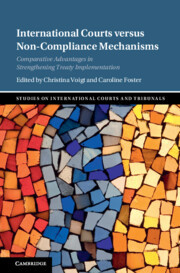International Courts versus Non-Compliance Mechanisms Comparative Advantages in Strengthening Treaty Implementation Studies on International Courts and Tribunals Series
Langue : Anglais
Coordonnateurs : Voigt Christina, Foster Caroline

This book explores the best mechanisms for helping bring about compliance with international treaties. In recent years, many international treaties have included non-compliance mechanisms (NCMs) to facilitate implementation and promote parties' compliance with their obligations. These NCMs exist alongside the formal dispute resolution processes of international courts and tribunals. The authors bring together a wide legal and geographical spectrum of views from different parts of the world representing novel insights into NCMs' contribution to treaty implementation and compliance. The research has cast important light on how procedural innovations may help render NCMs more effective, as well as on the circumstances in which they may be needed, including particularly where nations share common interests, populations are interdependent, and implementation makes significant administrative, regulatory and political demands. This title is also available as Open Access on Cambridge Core.
Introduction; 1. Non-compliance mechanisms or international courts: how to increase treaty compliance? Foster Caroline and Voigt Christina; Part I. General and Conceptual Issues: 2. Lessons from the Paris agreement for international pandemic law and beyond Foster Caroline; 3. The new generation of environmental non-compliance procedures and the question of legitimacy Fitzmaurice Malgosia; 4. International courts v. compliance mechanisms through the lens of Gabcikovo-Nagymaros and Bystroe canal cases Pineschi Laura; Part II. Specific Procedures: 5. The advisory procedure in non-compliance procedures: lessons from the UNECE water convention Cruz Carrillo Carlos; 6. State-to-state procedures before compliance committees: still alive? Bendel Justine and Suedi Yusra; 7. Compliance with science-based treaties Das Rukmini; Part III. Trade, Finance and Investment: 8. Trade's enforcement conundrum Claussen Kathleen; 9. How should the world bank's dispute resolution services benefit affected persons and borrower states? Brosseau Jonathan; 10. IMF surveillance as a non-compliance mechanism Fahrner Ambroise; Part IV. Environment: 11. Legal mobilisation for biodiversity protection: assessing the complementary potential of the Bern's case file system and the European commission's infringement procedure Evangelidis Elena; 12. The right to a healthy environment in Latin America and the Caribbean: compliance through the Inter-American system and the Escazú agreement Tigre Maria Antonia; Part V. Human Rights: 13. Institutional overlap and comparative effectiveness: compliance with torture-related decisions of the European court of human rights, the human rights committee and the committee against torture in Europe von Staden Andreas; 14. The UK's compliance with the ICCPR and ECHR: a tale of two treaties White Samuel; 15. Exploring the role of decisions by judicial, quasi-judicial and specialised non-judicial bodies in advancing anti-trafficking efforts Magugliani Noemi and Gauci Jean-Pierre; 16. UN human rights treaty bodies' contribution to compliance with international environmental law: the growing importance of human rights treaty bodies in environmental dispute resolution Solntsev Alexander; Part VI. Criminal Law and Law of Disarmament: 17. Monitoring compliance in international criminal law Borlini Leonardo; 18. Non-compliance and nuclear disarmament – the Iran nuclear deal Sun Jin; Part VII. Cultural Heritage Law and Law of the Sea: 19. Protecting cultural heritage during military action: enforcing compliance with the 1954 Hague Convention in the case of the temple Preah Vihear Fabris Alice; 20. The South China sea arbitration – navigating compliance strategies through the lens of Raya and the last Dragon Cantorias-Marvel, Marie Jude; Index.
Christina Voigt is Professor of Law at the University of Oslo and Coordinator at Pluricourts – Center of Excellence, Chair of the IUCN World Commission on Environmental Law and Co-chair of the Paris Agreement Implementation and Compliance Committee. She is a renowned expert in international environmental law and has taught and published widely in this field. She is the editor of, inter alia, International Judicial Practice on the Environment – Questions of Legitimacy (Cambridge, 2019).
Caroline Foster is Professor of Law at the University of Auckland and Director of the New Zealand Centre for Environmental Law (NZCEL). She is the author of Global Regulatory Standards in Environmental and Health Disputes: Global Regulatory Standards in Environmental and Health Disputes (2021) and Science and the Precautionary Principle in International Courts and Tribunals: Expert Evidence, Burden of Proof and Finality (Cambridge, 2011).
Caroline Foster is Professor of Law at the University of Auckland and Director of the New Zealand Centre for Environmental Law (NZCEL). She is the author of Global Regulatory Standards in Environmental and Health Disputes: Global Regulatory Standards in Environmental and Health Disputes (2021) and Science and the Precautionary Principle in International Courts and Tribunals: Expert Evidence, Burden of Proof and Finality (Cambridge, 2011).
Date de parution : 02-2024
Ouvrage de 528 p.
Disponible chez l'éditeur (délai d'approvisionnement : 14 jours).
Prix indicatif 152,43 €
Ajouter au panierThème d’International Courts versus Non-Compliance Mechanisms :
© 2024 LAVOISIER S.A.S.



